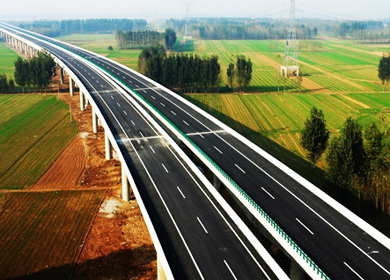Wingti, China and super highways in PNG
The suggestion by former prime minister Paias Wingti has geopolitics written all over it. As such, I find his suggestion interesting and relevant to our study of geopolitics in the Asia-Pacific region.
His suggestion also reflects the effect of China's soft power. China was able to make their domestic development and their capability to replicate such development in another country attractive enough to influence an experienced politician like Governor Wingti.
Henry Karukuru also made a valid point that Wingti was an advocate of the 'Look North' policy when he was prime minister. Back then, when China was not that developed compared to today, Wingti saw the potential in connecting with China. Unfortunately, he served only a short time so we did not see his foreign policy vision materialize.
As mentioned by many of you in your Glossary 3 entries, the Asia-Pacific region is dynamic. APEC itself as a multilateral forum confirms this dynamism. Some of the 21 member economies are among the top performing economies in the world.
Wingti called on the current prime minster to put up future mineral, oil and gas resources as collateral and invite China to build a network of 'super highways' to connect the country. To be specific, he said about 5% or 10% of the mining resources.
He highlighted the fact that China has the energy, drive, technology and funding under the 'One Belt One Road' policy to undergo projects of this magnitude. This is shown in the video below:
According to the second video below by Caspian Report, these are the institutions that are responsible for funding the 'One Belt One Road' policy:
- Asian Infrastructure Investment Bank
- Silk Road Fund
- China Development Bank
- Exim Bank of China
- Foreign-exchange reserves
- Sovereign wealth fund
Apart from the financial framework, China also has the technology to build super highways. I have traveled on the Changchun to Harbin segment of the Beijing-Harbin Highway. The road is massive and flat. There are some segments of the highway where they have used concrete slabs to elevate the road to avoid the flow of water.
The China-Pakistan express way below is a good example of the use of concrete slabs or pillars. If such technology was used on the Ramu or Markham segment of the highway then we will see less potholes. It will be useful when connecting Madang to East Sepik.
Most of you in our discussion identified economic interest as the national interest behind the suggestion by Governor Wingti. From my evaluation, I think these 3 points from the table categorizing national interest are related to the suggestion:
- promoting an adequate standard of living for domestic citizens
- promoting adequate levels of domestic employment
- ensuring economic development and growth
The super highways will promote domestic trade between provinces. Prawns like the ones below from Daru can be transported up to the Highlands where the market is big. In Madang, it cost K1 for one prawn compared to Daru where it is K4 for a group. That means Daru has more compared to Madang.
Phil Senginawa, a Foreign Service Officer serving in the PNG High Commission in Malaysia has talked about his experience of sharing PNG prawns with members of the diplomatic crops and government officials in Malaysia. That means there is demand for PNG prawns beyond our boarder.
We now have Engan strawberries from the Surinki Agriculture Farm. A super highway between Hagen and Madang will make it easy for the transportation of strawberries. This will increase the demand and eventually help grow the fresh food industry up in Enga. The growth of the industry means more farming jobs and money into the pockets of farmers.
Potatoes from Enga as well are being packaged and sold by Innovative Agro Industries (IAI). A super highway connecting the highlands to the coastal lowlands will help reduce the cost of freighting. This also means that the quantity transported to the markets will increase, putting demand on the farmers to produce more.
I support the suggestion made by the Governor for Western Highlands Province because the super highways will spark domestic trade and help develop the agriculture industry. For many years, many have made the remark that agriculture is the backbone of the country. Yes it is but we need to have transportation links to make it easy for transportation of our fish and vegetables to the markets around PNG.
Our minerals are non-renewable resources, while increase manufacturing will contribute to environmental pollution. If we want to preserve our environment then investing in agriculture is the step in the right direction. Enga Province is a case in point.


Comments
Post a Comment